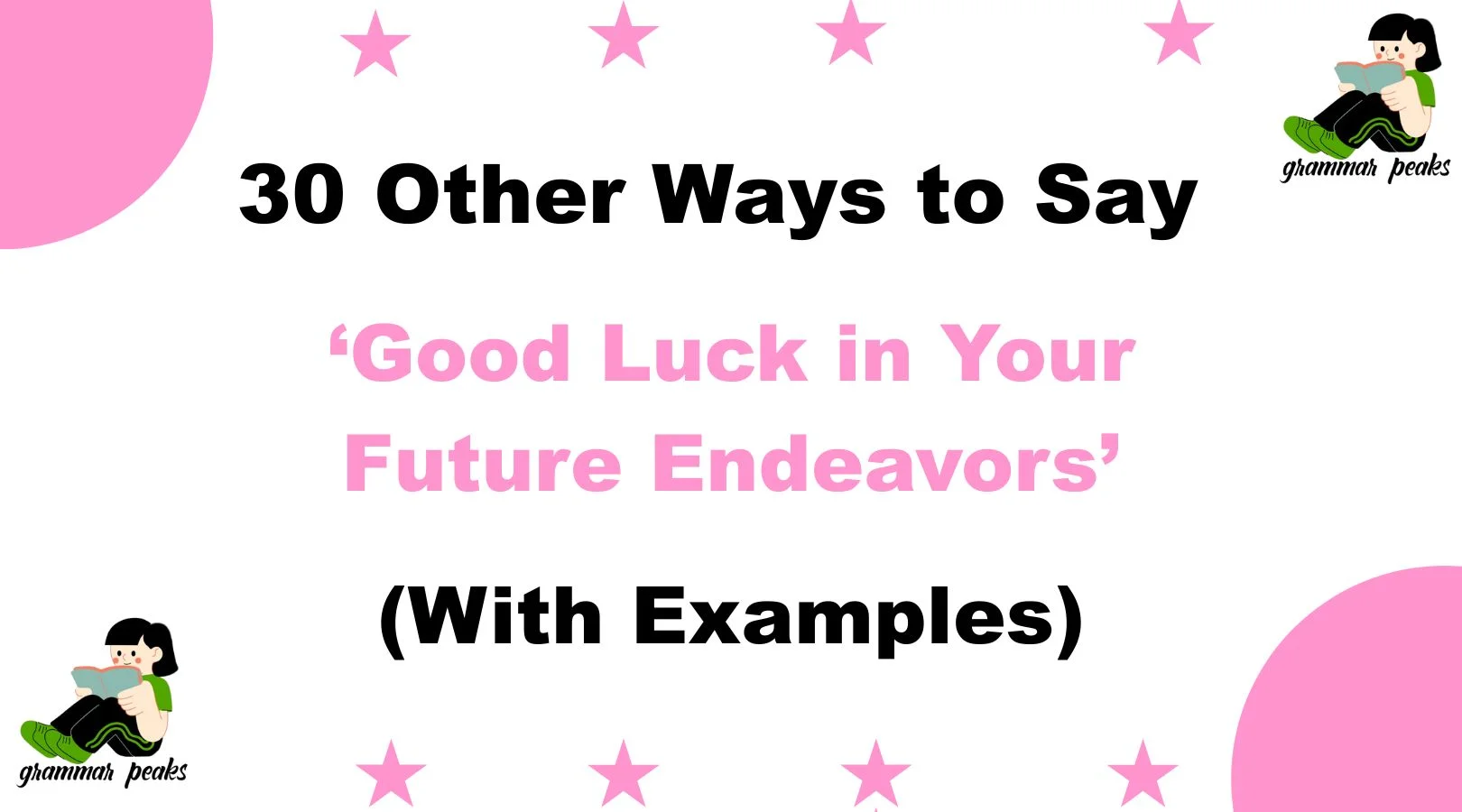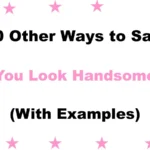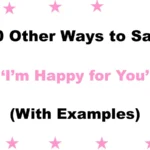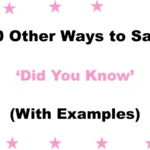Finding the right words to wish someone well as they move forward in life is truly important. It’s not just about saying something polite—it’s about conveying warmth, encouragement, and genuine care. Saying “Good luck in your future endeavors” can sometimes feel a bit formal or repetitive.
That’s why having thoughtful alternatives can help your message feel more personal and meaningful. Whether you’re writing a farewell card, sending an email, or offering verbal encouragement, the phrases below will help you express your support with sincerity and style.
What Does “Good Luck in Your Future Endeavors” Mean?
This phrase is a polite way to wish someone success in whatever they choose to do next. It acknowledges their past efforts and expresses hope that their upcoming activities or challenges will go well. It’s often used during farewells, job changes, graduations, or new projects. The phrase carries a tone of encouragement and optimism.
When to Use “Good Luck in Your Future Endeavors”
Use this phrase or its alternatives when you want to convey support and positivity as someone transitions into a new chapter. Ideal moments include:
- Leaving a job
- Graduating from school
- Starting a new project or venture
- Moving to a new city or country
It’s generally best used in professional or semi-formal contexts where you want to show respect and goodwill.
Is It Professional/Polite to Say “Good Luck in Your Future Endeavors”?
Yes, this phrase is both professional and polite. It is commonly used in workplaces, academic settings, and formal communications. However, in some casual or very close relationships, it might come across as a bit formal or impersonal, so using more heartfelt alternatives could feel warmer.
Pros and Cons of Saying “Good Luck in Your Future Endeavors”
Pros:
- Polite and respectful
- Suitable for formal and professional settings
- Clearly expresses good wishes for the future
Cons:
- Can sound generic or overused
- May lack warmth or personalization
- Sometimes too formal for casual or close relationships
Synonyms for “Good Luck in Your Future Endeavors”
- Wishing You All the Best in Your Next Chapter
- Here’s to Your Continued Success
- May Your Future Be Bright and Rewarding
- Best Wishes on Your New Journey
- Hoping Your Next Steps Bring You Joy
- Cheering You On in Your Future Plans
- Wishing You Great Achievements Ahead
- May You Thrive in What’s Next
- Sending Positive Vibes for Your Future
- Here’s to New Adventures and Opportunities
- May Success Follow You Wherever You Go
- Wishing You Prosperity in Your New Path
- All the Best as You Take on New Challenges
- Hope Your Future Is Filled with Accomplishments
- Rooting for Your Success Always
- May Your Dreams Unfold Beautifully
- Wishing You Strength and Success Ahead
- May You Reach New Heights Soon
- Good Wishes for Your Upcoming Ventures
- Hoping You Shine Bright in Your Future
- Wishing You Happiness and Success on Your Path
- Here’s to Your Bright and Promising Future
- May Your Efforts Bring You Great Rewards
- Sending You Encouragement for What Lies Ahead
- Wishing You Luck and Joy in All You Do
- May Your Next Endeavors Bring Fulfillment
- Best of Luck as You Move Forward
- Hoping Your Future Is Filled with Opportunity
- Wishing You the Best in All Your Pursuits
- May Your Journey Ahead Be Successful and Joyful
1. Wishing You All the Best in Your Next Chapter
Definition: A warm way to express hope for success and happiness in the next phase of someone’s life.
Detailed Explanation: This phrase acknowledges the transition someone is making, whether personal or professional, and offers heartfelt wishes for positive experiences ahead.
Scenario Examples: Writing a farewell note to a colleague leaving the company or a friend moving to a new city.
Best Use: Personal and professional messages where warmth is desired.
Worst Use: Formal legal or highly technical communication where casual tone is inappropriate.
Tone: Warm, encouraging, and optimistic.
2. Here’s to Your Continued Success
Definition: A phrase expressing hope that the person’s success so far will keep going strong.
Detailed Explanation: It praises past achievements and projects confidence in the future, making it a motivating send-off.
Scenario Examples: Congratulating a coworker moving to a higher position or a student graduating.
Best Use: Professional or semi-formal settings.
Worst Use: Situations where the person is starting over after setbacks, as it may feel dismissive.
Tone: Supportive, positive, and confident.
3. May Your Future Be Bright and Rewarding
Definition: Wishing someone a future filled with happiness, success, and personal satisfaction.
Detailed Explanation: Emphasizes both external achievements and internal fulfillment, making it a holistic good wish.
Scenario Examples: Saying goodbye to a mentor retiring or a friend embarking on a new career.
Best Use: Personal messages that value emotional well-being alongside success.
Worst Use: Very formal business correspondence where emotional tone is minimal.
Tone: Caring, hopeful, and heartfelt.
4. Best Wishes on Your New Journey
Definition: A phrase encouraging and supporting someone starting a new phase in life or work.
Detailed Explanation: This message highlights the exciting nature of change and growth, implying support and optimism.
Scenario Examples: A message to a friend moving abroad or starting a new business.
Best Use: Informal to semi-formal contexts that celebrate change.
Worst Use: Situations where the transition is unplanned or unwanted.
Tone: Cheerful, supportive, and uplifting.
5. Hoping Your Next Steps Bring You Joy
Definition: A gentle way to express a wish for happiness and success in upcoming experiences.
Detailed Explanation: Focuses on emotional fulfillment rather than just achievement, showing empathetic concern.
Scenario Examples: Saying farewell to someone who is leaving a stressful job for a more fulfilling one.
Best Use: Personal notes or cards.
Worst Use: Highly formal professional communication.
Tone: Warm, empathetic, and positive.
6. Cheering You On in Your Future Plans
Definition: An enthusiastic expression of encouragement and support for what lies ahead.
Detailed Explanation: Shows active support and belief in the person’s potential, as if rooting for them.
Scenario Examples: Sending a message to a friend starting a creative project or competition.
Best Use: Informal, friendly situations.
Worst Use: Formal business or academic communications.
Tone: Energetic, friendly, and motivational.
7. Wishing You Great Achievements Ahead
Definition: A formal wish for notable success and accomplishments in the future.
Detailed Explanation: Focuses on career or personal milestones, encouraging ambition and dedication.
Scenario Examples: Congratulating a colleague transferring to a challenging new role.
Best Use: Professional and formal contexts.
Worst Use: Personal or emotional contexts that require warmth.
Tone: Formal, respectful, and ambitious.
8. May You Thrive in What’s Next
Definition: A concise and strong wish for flourishing and success in future activities.
Detailed Explanation: “Thrive” implies not just surviving but growing strongly, making this phrase uplifting and empowering.
Scenario Examples: Encouraging someone starting a startup or new study program.
Best Use: Semi-formal messages with a positive, energetic vibe.
Worst Use: Casual messages where simpler language fits better.
Tone: Empowering, optimistic, and concise.
9. Sending Positive Vibes for Your Future
Definition: A casual, modern way to express goodwill and positive energy toward someone’s future.
Detailed Explanation: Often used among friends and younger audiences, this phrase conveys informal but genuine support.
Scenario Examples: Texting a friend who’s moving cities or starting a new relationship.
Best Use: Informal, friendly communication.
Worst Use: Professional or formal communication.
Tone: Casual, cheerful, and trendy.
10. Here’s to New Adventures and Opportunities
Definition: A hopeful and celebratory phrase that highlights excitement for future possibilities.
Detailed Explanation: Encourages a positive outlook on change and the unknown, emphasizing growth.
Scenario Examples: Toasting a friend leaving for travel or a career shift.
Best Use: Informal to semi-formal contexts.
Worst Use: Situations requiring solemn or serious tone.
Tone: Optimistic, celebratory, and upbeat.
11. May Success Follow You Wherever You Go
Definition: A heartfelt wish that success stays with someone in every step of their future.
Detailed Explanation: This phrase emphasizes the idea that the person deserves continued success, no matter where life takes them.
Scenario Examples: A message to someone relocating for a new job or adventure.
Best Use: Both professional and personal settings where you want to sound kind and respectful.
Worst Use: Situations requiring very casual or playful language.
Tone: Encouraging, respectful, and hopeful.
12. Wishing You Prosperity in Your New Path
Definition: A formal yet warm way to express hopes for wealth, growth, and well-being.
Detailed Explanation: The word “prosperity” implies overall flourishing—financial, emotional, and professional.
Scenario Examples: A farewell letter to a colleague starting a business or joining another firm.
Best Use: Formal or professional farewell letters and speeches.
Worst Use: Casual messages to close friends or informal chats.
Tone: Formal, optimistic, and elegant.
13. All the Best as You Take on New Challenges
Definition: A strong yet polite way to encourage someone as they step into unfamiliar or difficult territory.
Detailed Explanation: It acknowledges the possible difficulty ahead, while expressing confidence and support.
Scenario Examples: Encouraging someone who’s starting a demanding degree program or leadership role.
Best Use: Professional or academic encouragement.
Worst Use: When a lighter, more relaxed tone is needed.
Tone: Supportive, respectful, and strong.
14. Hope Your Future Is Filled with Accomplishments
Definition: A phrase focused on achievement and recognition in future efforts.
Detailed Explanation: This alternative shows appreciation for the person’s potential and expresses a desire for them to succeed in measurable ways.
Scenario Examples: Graduation cards, job transitions, or promotions.
Best Use: Academic and professional congratulations.
Worst Use: Emotional or personal moments that focus more on inner happiness.
Tone: Goal-oriented, respectful, and motivating.
15. Rooting for Your Success Always
Definition: A casual yet loyal way to say you’ll always support someone’s growth and progress.
Detailed Explanation: This phrase creates a sense of ongoing emotional support, almost like cheering from the sidelines.
Scenario Examples: Sending a message to a friend starting a podcast or personal project.
Best Use: Friendly and informal conversations or notes.
Worst Use: Highly professional communications.
Tone: Friendly, loyal, and sincere.
16. May Your Dreams Unfold Beautifully
Definition: A poetic and warm way to wish someone gentle and meaningful progress toward their aspirations.
Detailed Explanation: It suggests that their journey should not only be successful but also graceful and personally fulfilling.
Scenario Examples: Notes to artists, writers, or anyone pursuing a dream-based path.
Best Use: Personal or sentimental messages.
Worst Use: Strictly formal or professional documents.
Tone: Inspirational, heartfelt, and poetic.
17. Wishing You Strength and Success Ahead
Definition: A phrase that combines encouragement for both the effort and the outcome of future challenges.
Detailed Explanation: It recognizes that success often requires inner strength, perseverance, and resilience.
Scenario Examples: Writing to someone recovering from burnout or stepping into a demanding new role.
Best Use: Supportive and honest messages where empathy is needed.
Worst Use: Lighthearted or playful occasions.
Tone: Sincere, strong, and empowering.
18. May You Reach New Heights Soon
Definition: A motivating way to wish someone impressive growth and accomplishment.
Detailed Explanation: “New heights” suggests breaking barriers and achieving something above and beyond expectations.
Scenario Examples: Congratulating a student starting graduate school or a professional beginning a promotion.
Best Use: Formal and inspirational settings.
Worst Use: Casual texts or humor-filled messages.
Tone: Ambitious, hopeful, and professional.
19. Good Wishes for Your Upcoming Ventures
Definition: A balanced and polite phrase for expressing hope in someone’s new efforts or goals.
Detailed Explanation: “Ventures” can refer to personal or business projects, making this phrase versatile and useful.
Scenario Examples: Farewell to someone starting a company or launching a creative project.
Best Use: Mixed formal-informal situations where tone matters.
Worst Use: Overly emotional or highly casual contexts.
Tone: Polite, practical, and flexible.
20. Hoping You Shine Bright in Your Future
Definition: A sweet, uplifting wish that someone stands out and excels in what’s ahead.
Detailed Explanation: It uses the metaphor of “shining” to show admiration and hope that they’ll be recognized and appreciated.
Scenario Examples: Graduation speeches, farewell cards, or encouraging a child’s creative path.
Best Use: Inspirational and affectionate contexts.
Worst Use: Business letters or formal workplace memos.
Tone: Bright, emotional, and uplifting.
21. Wishing You Happiness and Success on Your Path
Definition: A heartfelt phrase that combines emotional fulfillment with achievement.
Detailed Explanation: Acknowledges that both joy and success are important, making it holistic and empathetic.
Scenario Examples: Saying goodbye to a team member or sending off a sibling to college.
Best Use: Versatile for both personal and professional use.
Worst Use: Rarely inappropriate, but not suitable for sarcasm or humor.
Tone: Warm, caring, and inclusive.
22. Here’s to Your Bright and Promising Future
Definition: A hopeful and respectful message that someone has great things ahead of them.
Detailed Explanation: “Bright and promising” reflects strong belief in the person’s potential and upcoming opportunities.
Scenario Examples: Toasting a colleague leaving for a new job.
Best Use: Formal gatherings or professional ceremonies.
Worst Use: Very casual messages or texts.
Tone: Formal, confident, and proud.
23. May Your Efforts Bring You Great Rewards
Definition: A phrase that encourages perseverance while expressing hope for positive results.
Detailed Explanation: It implies that the person’s hard work is worthy and will pay off, which boosts morale and motivation.
Scenario Examples: Messages to students, coworkers, or anyone facing a big challenge.
Best Use: Situations requiring both encouragement and appreciation.
Worst Use: Playful or humorous situations.
Tone: Motivating, respectful, and forward-looking.
24. Sending You Encouragement for What Lies Ahead
Definition: A gentle and supportive way to let someone know you believe in their ability to handle future challenges.
Detailed Explanation: “Encouragement” here implies faith, kindness, and solidarity—not just wishing luck, but offering moral support.
Scenario Examples: Comforting a friend switching careers or a mentee facing uncertainty.
Best Use: Personal, emotional, or transitional moments.
Worst Use: Strictly formal business settings.
Tone: Supportive, reassuring, and calm.
25. Wishing You Luck and Joy in All You Do
Definition: A friendly and comprehensive wish for both success and happiness in someone’s actions.
Detailed Explanation: It blends emotional and practical wishes—hoping the person is both fortunate and fulfilled.
Scenario Examples: Saying goodbye to a coworker or congratulating a friend starting a new chapter.
Best Use: Friendly messages, cards, and social posts.
Worst Use: Highly professional or legal documents.
Tone: Balanced, cheerful, and kind.
26. May Your Next Endeavors Bring Fulfillment
Definition: A meaningful phrase that focuses on emotional satisfaction in upcoming experiences.
Detailed Explanation: Unlike messages that highlight only success or achievement, this one values inner peace and joy—not just results.
Scenario Examples: A note to someone leaving a demanding job in search of something more personally meaningful.
Best Use: When addressing someone prioritizing well-being or balance in their next step.
Worst Use: Highly competitive or achievement-focused environments.
Tone: Gentle, heartfelt, and thoughtful.
27. Best of Luck as You Move Forward
Definition: A clear and polite way to wish someone success in their future path.
Detailed Explanation: This phrase acknowledges change while wishing the person the best as they take the next step. It’s a more relaxed variation of the main keyword.
Scenario Examples: Ending an email to a colleague who is transferring to another department.
Best Use: Semi-formal to informal messages with a respectful tone.
Worst Use: Very formal business letters.
Tone: Polite, casual, and respectful.
28. Hoping Your Future Is Filled with Opportunity
Definition: A phrase expressing optimism about the chances and possibilities someone will encounter.
Detailed Explanation: Instead of focusing on outcomes, this message focuses on open doors, giving it a visionary and encouraging tone.
Scenario Examples: Saying goodbye to someone embarking on a new career path or life journey.
Best Use: Supportive messages about uncertain but exciting transitions.
Worst Use: When the outcome is already known or predetermined.
Tone: Encouraging, open-ended, and visionary.
29. Wishing You the Best in All Your Pursuits
Definition: A flexible, respectful phrase that can apply to both personal and professional goals.
Detailed Explanation: “Pursuits” is an elegant word that covers a wide range of aspirations, making this a versatile farewell option.
Scenario Examples: Farewell email to a departing coworker or a graduation message.
Best Use: Broad, polite send-offs where multiple types of future goals may be involved.
Worst Use: Very close friendships or humorous farewells where a warmer tone is needed.
Tone: Formal, sincere, and well-rounded.
30. May Your Journey Ahead Be Successful and Joyful
Definition: A closing blessing-style phrase that blends hope for achievement and happiness in whatever lies ahead.
Detailed Explanation: It combines both the external success and inner emotional experience of someone’s next journey—making it well-rounded and heartfelt.
Scenario Examples: Retirement speeches, farewell gatherings, or formal goodbyes.
Best Use: When saying goodbye to someone whose path forward is inspiring and admirable.
Worst Use: Brief or humorous interactions.
Tone: Warm, respectful, and gracious.
Conclusion
Wishing someone well in their future endeavors doesn’t have to be stiff or repetitive. With these 30 thoughtful alternatives, you now have a rich vocabulary to express warmth, encouragement, and genuine respect—no matter the situation. Whether you’re parting ways with a coworker, celebrating a friend’s next step, or sending a card to someone you admire, the right phrase can leave a lasting, meaningful impression.
Use these alternatives to speak from the heart and make your words truly memorable. Because in the end, it’s not just about saying goodbye—it’s about showing that you care about their journey ahead.
FAQs
1. What does “Good Luck in Your Future Endeavors” really mean?
It’s a formal way of saying you hope someone finds success and satisfaction in whatever comes next. It’s respectful, but sometimes feels a bit impersonal.
2. Is it okay to use this phrase in professional emails?
Yes, it’s considered polite and appropriate in most professional contexts, especially during farewells, resignations, or promotions.
3. Which alternatives sound more personal or warm?
Phrases like “May your dreams unfold beautifully” or “Wishing you happiness and success on your path” add more emotional depth than the traditional version.
4. Can these alternatives be used in graduation speeches?
Absolutely! Many of these expressions—like “May you reach new heights soon” or “Here’s to your bright and promising future”—are perfect for graduations or milestone events.
5. What’s the best way to make a farewell message memorable?
Pair one of these thoughtful phrases with a personal memory, compliment, or piece of advice. That way, your message feels not just nice—but genuinely meaningful.

Mariah Cannon is a dedicated Senior Content Specialist at GrammarPeaks, known for her clear, engaging writing and deep knowledge of English grammar and usage. With a background in linguistics and years of experience in content development, Mariah crafts informative and accessible articles that empower readers to master the nuances of the English language. Her work reflects a commitment to clarity, education, and helping others express themselves with confidence.





